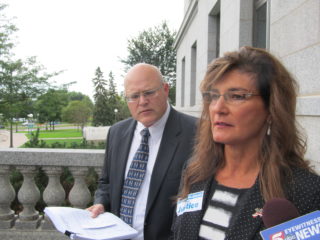The Minnesota Court of Appeals today upheld a ruling that the First Amendment does not allow a 2016 candidate for Minnesota Supreme Court to lie about receiving the endorsement of the Republican Party of Minnesota Republican Party of Minnesota’s Judicial Selection Committee.
Michelle MacDonald made the claim in information she supplied to the Star Tribune as part of the newspaper’s voter’s guide. The paper printed it.

An administrative panel ruled she violated Minnesota law, which says “a person or candidate may not knowingly make, directly or indirectly, a false claim stating or implying that a candidate or ballot question has the support or endorsement of a major political party or party unit or of an organization.”
Generally, speech that is curtailed based on its content risks running afoul of the First Amendment protections, but the court said there’s a compelling state interest in “promoting informed voting and protecting the political process.”
“The plainly legitimate purpose of Minn. Stat. § 211B.02 is preventing false speech that misleads the public regarding elections,” Judge Louise Bjorkman wrote on behalf of the three-judge panel (see ruling). “MacDonald argues that the statute substantially sweeps outside this aim and chills truthful political speech because ‘a candidate cannot truthfully report a sub-unit’s endorsement without threat of a violation that the statement is false because [the RPM] did not endorse.’ This argument is unavailing.”
First, the statute on its face only prohibits a candidate from making a “knowingly false claim.” Truthful political speech is not proscribed by the statute. In Schmitt, our supreme court considered a predecessor statute of section 211B.02 that similarly prohibited a candidate from making a false claim of endorsement or support from a political party or sub-unit of a political party.
The supreme court observed the statute was narrowly tailored to defeat an overbreadth challenge because it was “directed specifically at false claims of endorsement or support.” Moreover, the statute’s specific-intent requirement—that false claims be knowingly made—ensures that “the statute does not target broad categories of speech.”
Second, we reject MacDonald’s contention that the statute prohibits a candidate from truthfully reporting receipt of a party sub-unit’s endorsement. Neither the statutory language nor OAH’s decision supports MacDonald’s assertion that the statute prohibits her from claiming endorsement or support of a sub-unit of the RPM because the party did not endorse her. OAH’s determination that she violated section 211B.02 was not based on the fact that the RPM did not endorse her. Rather, OAH found that she violated the statute by claiming that the judicial-election committee endorsed her when it had not and lacked the authority to do so.
Indeed, OAH observed that MacDonald “could have truthfully stated in her candidate profile that a majority of the RPM’s judicial election committee supported her candidacy.” It is the falsity of her statement that the committee endorsed her candidacy
that violated the statute.
MacDonald, a St. Paul attorney, won her party’s endorsement in her 2014 bid against Supreme Court justice David Lillehaug. But the party disavowed her after she was arrested on a DUI charge. MacDonald sued the party and was ejected from the party’s booth at the Minnesota State Fair.
Nonetheless, she received 40 percent of the vote last November while trying to unseat Justice Natalie Hudson.
One other takeaway from today’s decision: Don’t believe everything you read in a voter’s guide.
[Correction: The initial post indicated the issue involved the endorsement of the Republican Party of Minnesota. It did not. It involved the judicial selection committee of the Republican Party of Minnesota, which recommends endorsements to the party, but does not, itself, endorse candidates. After receiving the committee’s recommendation for endorsement, the party chose not to endorse MacDonald. The “Endorsements” section of the Star Tribune’s voter guide indicated that MacDonald received an endorsement from “GOP’s Judicial Selection Committee 2016.”]
